
How To Take Care of a Small Dog: Caring for Smaller Breeds
Want to know how to take care of a small dog? Give them lots of love!
That simple principle lies at the heart of all you do for your little furball and serves as the foundation for everything we’ll discuss in this article.
Along the way, we’ll touch on various tips for how to take care of a dog, including feeding habits, activity, safety, training, and supporting overall health.
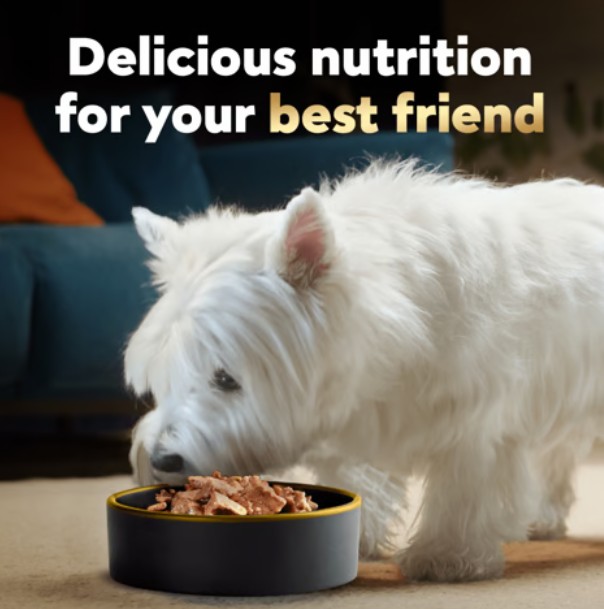
How To Feed Your Small Dog
Feed Your Pup High-Quality Dog Food
One of the best ways to take care of a small dog is to feed them high-quality dog food. The food you choose should meet the standards presented by the Association of American Feed Control Officials (AAFCO(open in new tab)) Dog Food Nutrient Profiles.
These standards help ensure that your pup has all the vitamins, minerals, and nutrients they need.
For example, CESAR® Wholesome Bowls™(open in new tab) recipes are made with real chicken or beef as the first ingredient and deliver 100% complete and balanced nutrition for adult dogs.
Monitor Portion Size and Treats
Check with your vet about portion size and the maximum daily caloric needs of your furry little friend, and adjust their diet accordingly.
This includes treats as well. Those little morsels may not look like much calorie-wise, but they can quickly add up.
Be mindful of the number of treats you give your pup every day, and remember that it’s easy to overfeed a small dog. If that happens, and they’re not getting enough exercise, they can become obese and develop health problems.
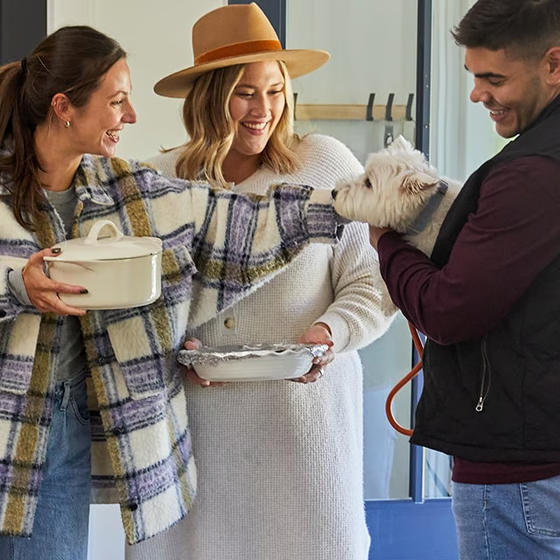
Ideas for Helping Your Small Dog Stay Active
Take Regular Walks
Small dogs need plenty of exercise, so make it a point to take them on regular walks around the block, to the park, or to visit their furry friends(open in new tab).
If you have an enclosed dog park nearby, consider walking your pooch there, removing their harness, and throwing a ball or frisbee for them to retrieve (more on both of the last two things in a moment).
Dog parks are a great way to give your doggie the freedom to run while, at the same time, giving them an opportunity to socialize with other dogs.
Try Indoor Playtime
Can’t get to the dog park or out for a walk because of work, weather, or other restrictions? Implement indoor playtime with your furry friend for maximum mental and physical health benefits.
Small dogs don’t need a lot of space to exercise, so consider tossing their favorite chew toy(open in new tab) across the room for them to chase, or play hide-and-seek or tug-of-war to keep your pup active and happy.
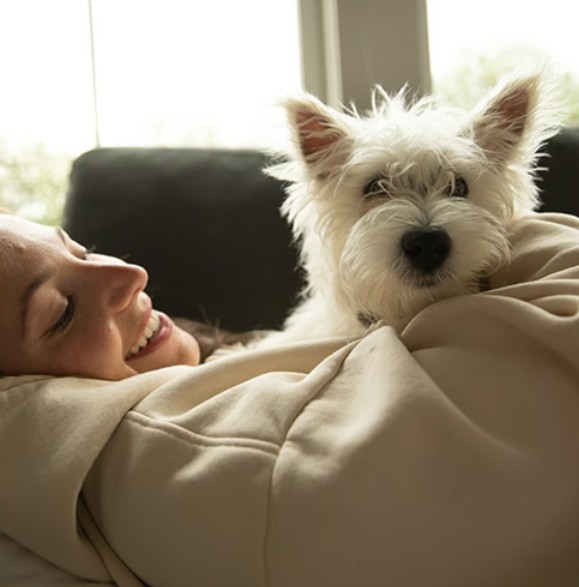
How To Keep Your Small Dog Safe
Prevent Falls
Because of their size, falls off furniture can be worse for small dogs than they are for bigger dogs.
Train your dog to signal and then wait for you to lift them off the chair, couch, or bed so they don’t hurt their tiny limbs by falling from what, to them, is a considerable height.
Another simple option for preventing falls is to provide ramps or stairs that your pup can use to access the furniture they’re allowed on.
Minimize Big Jumps
Similarly, your small dog attempting to jump up to, down from, or between pieces of furniture can sometimes lead to injuries if you don’t take steps to help prevent falls.
Consider leaving soft blankets near the furniture they can access (in case they miss the jump) or position chairs and other seating options close enough together that they don’t have to perform a big leap to move from one to the other.
Be Mindful of the Temperature
In most cases, small dogs are more susceptible to temperature than large dogs. That means they can lose heat faster (get cold) and overheat quicker than their bigger counterparts.
In hot conditions, be mindful of the ground temperature during walks, avoid exercise during the hottest part of the day, and provide shade and plenty of water to keep your dog cool.
In cold conditions, avoid the snow when going for walks, dress them in a sweater(open in new tab) to keep their body heat in, and consider playing inside on really cold days
Tips for Training Your Small Dog
Take Your Dog to Training Classes
Just like large dogs, small dogs can benefit from training. Whether your canine companion is a puppy or an older dog, training classes are always a good idea.
There, they’ll learn the basics of good dog behavior(open in new tab) — not jumping up on visitors, when and when not to bark, sit, stay, etc. — and become a more well-behaved member of the family.
Teach Obedience Commands
Some obedience classes will teach basic concepts such as sit, stay, and come. If they don’t, it’s important to practice these commands as much as possible — especially when your small dog is young.
These obedience commands are more than just neat tricks; they can actually help you train your dog in more complex situations(open in new tab)
For example, using the sit command while you’re filling their food dish can train them to wait until you’re finished before they dive into their meal.
Use Positive Reinforcement
When you’re training your dog, use positive reinforcement — treats, pets, playtime — to help them learn the acceptable behaviors you want them to exhibit.
This is especially true when teaching them the obedience commands mentioned above. Dole out plenty of treats when they’re first learning new skills.
Once they become more consistent, you don’t have to give a treat every time they do what you ask, but it’s still important to reward their behavior now and again to keep them behaving well.
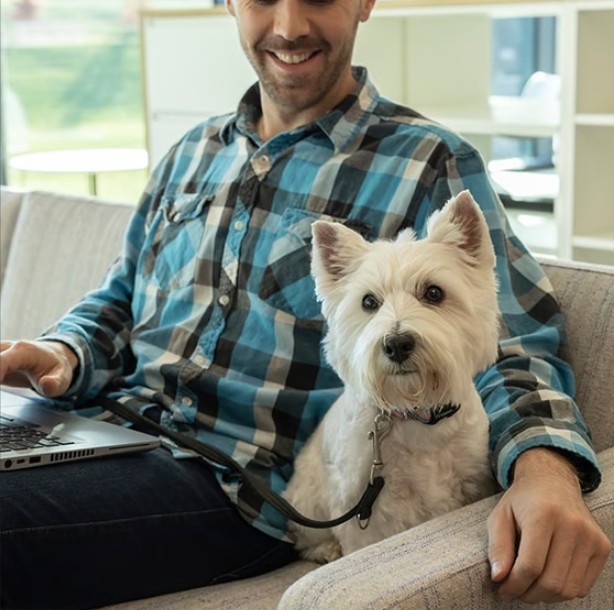
How To Take Care of Your Small Dog’s Overall Health
Take Your Pup for Vet Checkups
Regular visits to the vet can help your small dog stay happy and healthy for years to come.
The American Kennel Club (AKC(open in new tab)) recommends that puppies(open in new tab) visit the vet every few months (sometimes more often) during their first year of life for essentials such as vaccines, diet advice, flea and tick prevention, and discussions about spaying or neutering.
Adult dogs should visit the vet at least once a year for vaccines and basic wellness checks. Senior dogs may have to visit the vet more often depending on breed and existing medical conditions.
Of course, although the above guidelines are a great starting point, it’s always important to check with your vet for visit recommendations for your specific dog.
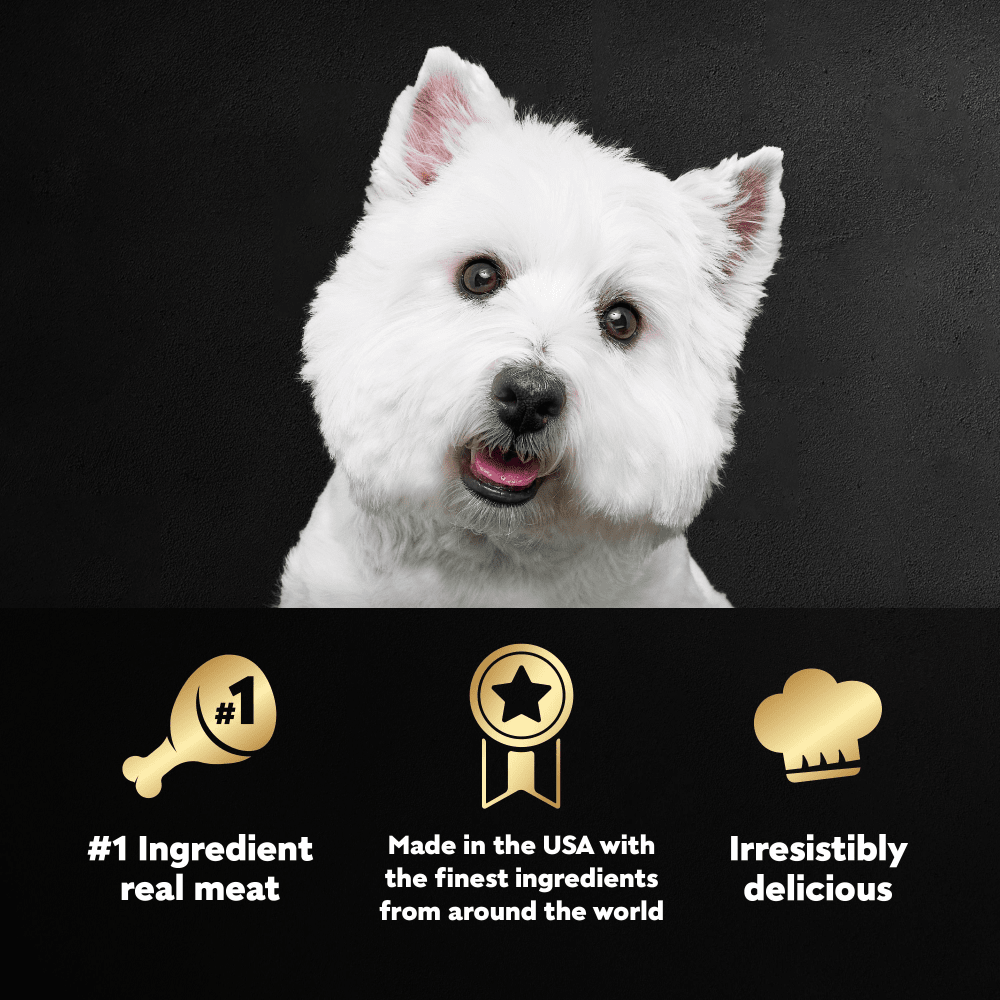
Care for Their Teeth
Dental hygiene is important for all dogs. Brushing your pooch’s teeth regularly can help to prevent tooth decay and even help reduce bad breath.
In addition to brushing, consider giving your dog dental chews to help remove the plaque and bacteria that can cause problems in their mouth.
Small Dog, Big Nutrition!
As we mentioned, one of the best ways to take care of a small dog is to feed them high-quality food specifically formulated for small breeds.
CESAR® Canine Cuisine is just what you need!
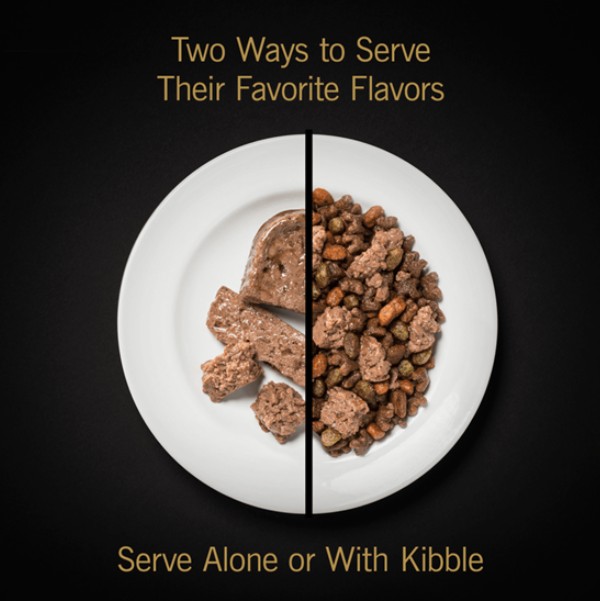
Our gourmet wet dog food(open in new tab) is formulated for small dogs and comes in a wide range of recipes and textures to satisfy even the pickiest eaters.
If dry food is your dog’s jam, try our dry recipes(open in new tab) carefully formulated to meet the nutritional levels established by the AAFCO Dog Nutrient Profiles for Maintenance and contain 26 key nutrients for little bodies. Even the shape of our kibble is ideal for small mouths.
So, to care for your small dog, remember: give them lots of love, feed them nutritious food, make sure they get plenty of exercise, keep them safe, provide the right type of training, and visit the vet on a regular basis.
For more information on how to provide a happy and healthy life for your dog, explore more of CESAR.com(open in new tab) today.